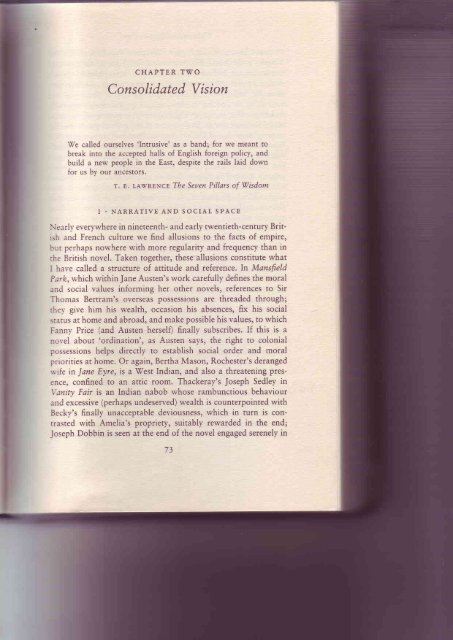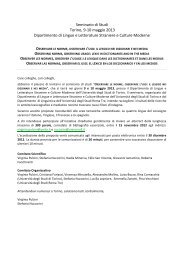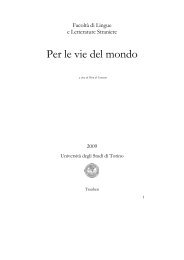Consolidated Vision
Consolidated Vision
Consolidated Vision
You also want an ePaper? Increase the reach of your titles
YUMPU automatically turns print PDFs into web optimized ePapers that Google loves.
CHAPTER TWO<br />
<strong>Consolidated</strong> <strong>Vision</strong><br />
We called ourselves<br />
'Intrusive'<br />
as a band; for we meant to<br />
break into the accepted halls of English foreign policy, and<br />
build a new people in the East, despite the rails laid down<br />
for us by our ancestors.<br />
r. E. LA'wRENcs The Seuen Pillars of Wisdom<br />
I NARRATIVE AND SOCIAL SPACE<br />
\early everywhere in nineteenth- and early twentieth-century Britrsh<br />
and French culture we find allusions to the facts of empire,<br />
bur perhaps nowhere with more regularity and frequency than in<br />
rhe British novel. Taken together, these allusions constitute what<br />
I have called a structure of attitude and reference. In Mansfield<br />
Par,t, which within Jane Austen's work carefully defines the moral<br />
and social values informing her other novels, references to Sir<br />
Thomas Bertram's overseas possessions are threaded through;<br />
rhev give him his wealth, occasion his absences, 6x his social<br />
srarus at home and abroad, and make possible his values, to which<br />
Fanny Price (and Austen herself) finally subscribes. If this is a<br />
novel about 'ordination', as Austen says, the right to colonial<br />
possessions helps directly to establish social order and moral<br />
priorities at home. Or again, Bertha Mason, Rochester's deranged<br />
n'ife in lane Eyre, is a 'S7est<br />
Indian, and also a threatening presence,<br />
confined to an attic room. Thackeray's Joseph Sedley in<br />
Yanity Fair is an Indian nabob whose rambunctious behaviour<br />
and excessive (perhaps undeserved) wealth is counterpointed with<br />
Becky's finally unacceptable deviousness, which in turn is contrasted<br />
with Amelia's propriety, suitably rewarded in the end;<br />
Joseph Dobbin is seen at the end of the novel engaged serenely in<br />
/)
Culture and lmPerialism<br />
wriring a history of the Punjab. The good ship Rose in charles<br />
Kingsl-ey's westward Hol wanders through the caribbean and<br />
South America. In Dickens's Great Expectations, Abel Magwitch<br />
is the convict transported to Australia whose wealth-conveniently<br />
removed from Pip's triumphs as a provincial lad<br />
flourishing in London in the guise of a gentleman-ironically<br />
makes possible the great expectations Pip entertains. In<br />
_-"ty<br />
other óickens novels businessmen have connections with the<br />
empire, Dombey and Quilp being rwo noteworthy examples' For<br />
Disraeli's Tancred and Eliot's Daniel Deronda, the East is partly<br />
a habitat for native peoples (or immigrant European populations),<br />
a crucial setting.<br />
The situation in France was different, in so far as the French<br />
France suffered during the Revolution and the Napoleonic era<br />
meanr that its empire had a less secure identity and presence in<br />
French culture. In Chateaubriand and Lamartine one hears the<br />
finds in Britain.<br />
There is also a dense body of American writing, contemporary<br />
with this British and French work, which shows a peculiarly<br />
acute imperial cast, even though paradoxically its ferocious anticolonialism,<br />
directed at the Old Vorld, is central to it. One thinks,<br />
for example, of the Puritan 'errand into the wilderness' and,<br />
later, of that extraordinarily obsessive concern in Cooper, Twain,<br />
Melville, and others with United States expansion westward,<br />
74
erons **,ith the *n r,,l*"',ir!*:::::':^destruction or native<br />
.{merican life (as memorably studied by Richard slotkin, patricia<br />
l-rmerick, and Michael Paul Roginl); an imperial motif emerges<br />
to rir-al the European one. (ln chapter Four of this book I shall<br />
dcal u'irh other and more recenr aspecrs of the united States in<br />
ns lare nventieth-cenrury imperial form.)<br />
.\s a reference, as a point of definition, as an easily assumed<br />
place of rravel, wealth. and service, the empire functions for much<br />
of rhe European nineteenth century as a codified, if only marpnallv<br />
visible, presence in fiction, very much like the servants in<br />
grand households and in novels, whose work is taken for granted<br />
bur scarcely ever more than named, rarely studied (though Bruce<br />
Robbins has rgcently written on them2), or given density. To cite<br />
enorher intriguing analogue, imperial possessions are as usefully<br />
tl,ere. anonymous and collective, as the outcast populations (analr-sed<br />
bv Gareth Stedman Jones3) of transienr workers, part-time<br />
emplovees, seasonal artisans; their existence always counts,<br />
rhough rheir names and identities do noq they are profitable<br />
*'irhour being fully there. This is a literary equivalent, in Eric<br />
S'olf's somewhat self-congratulatory words, of .people without<br />
Hisron'',a people on whom the economy and poliry sustained by<br />
empire depend, but whose reality has not historically or culturally<br />
required attention.<br />
In all of these instances the facts of empire are associated with<br />
susrained possession, with far-flung and sometimes unknown<br />
spaces, with eccentric or unacceptable human beings, with forrune-enhancing<br />
or fantasized activities like emigration, moneymaking,<br />
and sexual adventure. Disgraced younger sons are sent<br />
off ro the colonies, shabby older relatives go there to rry to recoup<br />
losr fortunes (as in Balzac's La Cousine Bette), enterprising young<br />
rrar-ellers go there to sow wild oats and to collect exotica. The<br />
rhe African, Pacific, and Atlantic wilderness. But most of the-.i<br />
great nineteenth-century realistic novelists are less assertive about<br />
colonial rule and possessions than either Defoe or late writers like<br />
75
Cuhure and Imperialism<br />
Conrad and Kipling, during whose time great electoral reform<br />
and mass participation in politics meant that imperial competition<br />
became a more intrusive domestic topic. In the closing year of the<br />
nineteenth century, with the scramble for Africa, the consolidation<br />
of the French imperial Union, the American annexation of the<br />
Philippines, and British rule in the Indian subcontinent at its<br />
height, empire was a universal concern.<br />
What I should like to note is that these colonial and imperial<br />
realities are overlooked in criticism that has otherwise been extraordinarily<br />
thorough and resourceful in finding themes to discuss.<br />
The relatively few writers and critics who discuss the relationship<br />
befween culture and empire-among them Martin Green, Molly<br />
Mahood, John McClure, and in particular Patrick Brantlingerhave<br />
made excellent contributions, but their mode is essentially<br />
narrative and descriptive-pointing out the presence of themes,<br />
the importance of certain historical conjunctures, the influence<br />
or persistence of ideas about imperialism-and they cover huge<br />
amounts of material.s In almost all cases they write critically of<br />
imperialism, of that way of life that Iíilliam Appleman rùfilliams<br />
describes as being compatible with all sorts of other ideological<br />
persuasions, even antinomian ones, so that during the nineteenth<br />
century'imperial outreach made it necessary to develop an appropriate<br />
ideology' in alliance with military, economic, and political<br />
methods. These made it possible to 'preserve and extend the<br />
empire without wasting its psychic or cultural or economic substance'.<br />
There are hints in these scholars' work that, again to<br />
quote '!ùfilliams,<br />
imperialism produces troubling self-images, for<br />
example, that of 'a benevolent progressive policeman'.6<br />
But these critics are mainly descriptive and positivist writers<br />
strikingly different from the small handful of generally theoretical<br />
and ideological contributions-among them Jonah Raskin's TÉe<br />
Mythology of Imperialism, Gordon Lewis's Slauery, Imperialism<br />
and Freedom: Studies in English Radical Thought, and V. G.<br />
Kiernan's Marxism and Imperialism and his crucial work, The<br />
Lords of Human Kind.7 All these books, which owe a great<br />
deal to Marxist analysis and premises, point out the centrality of<br />
imperialist thought in modern Westerh culture.<br />
Yet none of them has been anywhere as influential as thev<br />
76
ebo u r d h a v e b e n,,, ., ::: : ^:: :lo o H,, g a t rh e c a no n i c a r<br />
rorks of nineteenth-<br />
":;::':<br />
and twentieth-century European culture. The<br />
Eetor critical practitioners simply ignore imperialism. In recently<br />
rtreading Lionel Trilling's fine licle book on E" M. Forster, for<br />
osrance. I was struck that in his otherwise perceptive considerenon<br />
of Howards End he does not once mention imperialism,<br />
rhrch. in my reading of rhe book, is hard to miss, much less<br />
fEnore. Afrer all, Henry'$Tilcox and his family are colonial rubber<br />
gro\\'ers:<br />
'They had the colonial spirit, and were always making<br />
for some spots where the white man might carry his burden<br />
unobserr-ed.'8 And Forster frequently contrasts and associates that<br />
fzcr *-irh rhe changes taking place in England, changes that affect<br />
lronard and Jacky Bast, rhe schlegels, and Howards End itself.<br />
Or rhere is the more surprising case of Raymond \Tilliams, whose<br />
Cvlntre and society does not deal with the imperial experience at<br />
all. \\hen in an inrerview williams was challenged about this<br />
massir-e absence, since imperialism 'was not something which<br />
s'as secondary and external-it was absolutely constitutive of the<br />
whole narure of the English political and social order . . . the<br />
ralienr facr'e-he replied that his \7elsh experience, which ought<br />
ro ha'e enabled him to think about the imperial experience, was<br />
'r'enmuch<br />
in abeyance' at the time he wrote Culture and<br />
Sorrefr'.10) The few tantalizing pages in The Country and the City<br />
rhar rouch on culture and imperialism are peripheral to the book's<br />
main idea.<br />
\\hv did these lapses occur? And how was the centraliry of<br />
rhe imperial vision registered and supported by the culture that<br />
produced it, then to some extent disguised it, and also was transformed<br />
by it? Naturully, if you yourself happen ro have a colonial<br />
background, the imperial theme is a determining one in your<br />
formarion, and it will draw you ro it if you aiso happen to be a<br />
dedicared critic of European literature. An Indian or African scholar<br />
of English literature reads Kim, say, or Heart of Darkness<br />
s'irh a critical urgency not felt in quite the- same way by an<br />
-{merican or British one. But in what way can we formulate the<br />
relationship between culture and imperialism beyond the asseverarions<br />
of personal testimony? The emergence of formerly colonial<br />
subjecrs as interpreters of imperialism and its great cultural works<br />
77
Cubure and Imperialism<br />
has given imperialism a perceptible, not to say obtrusive identity<br />
as a subiect for study and vigorous revision. But how can thar<br />
particular kind of post-imperial testimony and study, usually left<br />
at the margins of critical discourse, be brought into active conracr<br />
with current theoretical concerns?<br />
To regard imperial concerns as consritutively significant to the<br />
culture of the modern Vest is, I have suggested, to consider that<br />
culture from the perspective provided by anti-imperialist resistance<br />
as well as pro-imperialist apology. tùlhat does this mean?<br />
It means remembering that Western writers until the middle of<br />
the t'wentieth century, whether Dickens and Austen, Flaubert or<br />
Camus, wrote with an exclusively STestern audience in mind, even<br />
when they wrote of characters, places, or situations that referred<br />
to, made use of, overseas territories held by Europeans. But just<br />
because Austen referred to Antigua in Mansfield Park or ro realms<br />
visited by the British navy in Persuasion without any rhoughr of<br />
possible responses by the Caribbean or Indian narives resident<br />
there is no reason for us to do the same. ìùle now know that<br />
these non-European peoples did not accepr with indifference the<br />
authoriry proiected over them, or the general silence on which<br />
their presence in variously attenuated forms is predicated.<br />
'!7e<br />
must therefore read the great canonical texts, and perhaps also the<br />
entire archive of modern and pre-modern European and American<br />
culture, with an effort to draw out, extend, give emphasis and<br />
voice to what is silent or marginally present or ideologically represented<br />
(I have in mind Kipling's Indian characters) in such<br />
works.<br />
\ h practical terms, 'conrrapuntal reading' as I have called it<br />
i means reading a text with an understanding of what is involved<br />
i when an author shows, for instance, that a colonial sugar plantation<br />
is seen as important to the process of maintaining a particular<br />
style of life in England. Moreover, like all literary rexrs, these<br />
are not bounded by their formal hisioric beginnings and endings.<br />
References to Australia in Dauid Copperfield or India in lane Eyre<br />
are made because they can be, because British power (and not<br />
just the novelist's fancy) made passing references to these massive<br />
appropriations possible; but the further lessons are no less rrue:<br />
that these colonies were subsequenrly liberated from direct and<br />
z8
<strong>Consolidated</strong> <strong>Vision</strong><br />
rule, a process<br />
that began and unfolded while the British<br />
olonialism and its destruction of the Algerian srate, and the later<br />
rltttcnce of an independent Algeria (which Camus opposed).<br />
Each rexr has its own particular genius, as does each geographicrl<br />
rcgion of the world, with its own overlapping experienies and<br />
-rdependent histories of conflict. As far as the cultural work is<br />
@cerned, a distinction befween particulariry and sovereignty (or<br />
bmetic exclusiveness) can usefully be made. obviously no readi<br />
should rry ro generalize so much as to efface the identity of<br />
e parricular text, author, or movement. By the same token it<br />
Lrston', administrators, and apologists and, no less importanr, ro<br />
ùc India foughr for by Indian nationalists as their counrry to be<br />
ron back. By giving an account of this series of pressures and<br />
@unrer-pressures in Kipling's India, we understand the process<br />
oí rmperialism itself as the great work of art engages them, and<br />
of larer anti-imperialist resistance. In reading a text, one must<br />
open ir out both to what went into it and to what its author<br />
crcluded. Each cultural work is a vision of a moment, and we<br />
musr juxrapose that vision with the various revisions it later<br />
provoked-in this case, the nationalist experiences of postrndependence<br />
India.<br />
In addition, one must connect the structures of a narrative to<br />
79
Culture and Imperialism<br />
into overt military or political resistance. The novel contributed<br />
significantly to these feelings, attitudes, and references and became<br />
a main element in the consolidated vision, or departmental cultural<br />
view, of the globe.<br />
I should specify how the novelistic contribution was made and<br />
also, conversely, how the novel neither deterred nor inhibited the<br />
more aggressive and popular imperialist feelings manifest after<br />
r88o.22 Novels are pictures of reality at the very early or the very<br />
late stage in the reader's experience of them: in fact they elaborate<br />
and maintain a reality they inherit from other novels, which they<br />
rearticulate and repopulate according to their creator's situation,<br />
gifts, predilections. Platt rightly stresses conseruation in the<br />
'departmental<br />
view'; this is significant for the novelist, too: the<br />
nineteenth-century English novels stress the continuing existence<br />
(as opposed to revolutionary overturning) of England. Moreover,<br />
they neuer advocate giving up colonies, but take the long-range<br />
view that since they fall within the orbit of British dominance,<br />
that dominance is a sort of norm, and thus conserved along with<br />
the colonies.<br />
What we have is a slowly built up picture with Englandsocially,<br />
politically, morally charted and differentiated in<br />
immensely fine detail-at the centre and a series of overseas territories<br />
connected to it at the peripheries. The continuity of British<br />
imperial policy throughout the nineteenth century-in fact, a nar<br />
rative-is actively accompanied by this novelistic process, whose<br />
main purpose is not to raise more questions, not to disturb or<br />
otherwise preoccupy attenticn, but to keep the empire more or<br />
less in place. Hardly ever is the novelist interested in doing a great<br />
deal more than mentioning or referring to India, for example, in<br />
Vanity Fair and lane Eyre, or Australia in Great Expectations.<br />
The idea is that (following the general principles of free trade)<br />
outlying territories are available for use, at will, at the novelist's<br />
discretion, usually for relatively simple purposes such as immigration,<br />
fortune, or exile. At the end of Hard Times, for example,<br />
Tom is shipped off to.the colonies. Not until well after midcentury<br />
did the empire become a principal subject of attention in<br />
writers like Haggard, Kipling, Doyle, Conrad as well as in emerging<br />
discourses in ethnography, colonial administration, theory<br />
88<br />
rq
<strong>Consolidated</strong> <strong>Vision</strong><br />
cconomy, the historiography of non-European regions, and<br />
idized subjects like Orientalism, exoticism, and mass psy-<br />
Thc actual interpretative consequences of this slow and steady<br />
of attitude and reference articuiated by the novel are<br />
. I shall specify four. The first is that, in literary history,<br />
unusual organic continuity can be seen between the earlier<br />
rrarives that are normally not considered to have much to do<br />
-t empire and the later ones expliciúy about it. Kipling and<br />
Gúrad are prepared for by Austen and Thackeray, Defoe, Scotr,<br />
rd Dickens; they are also interestingly connecred with their con-<br />
F 'pnraries like Hardy and James, regularly supposed to be only<br />
oincidenrally associated with the overseas exhibits presented by<br />
Òcir rarher more peculiar novelistic counrerparts. But both the<br />
brmal characteristics and the contents of all these novelists'works<br />
Ldong ro rhe same cuhural formation, the differences being rhose<br />
o{ rnflection, emphasis, stress.<br />
Second, the strucrure of attitude and reference raises the whole<br />
grsrion of power. Today's critic cannot and should not suddenly<br />
3n'e a novel legislative or direct political aurhoriry: we musr<br />
oonrlnue ro remember that novels participate in, are part of,<br />
conrribute ro an exrremely slow, infinitesimal politics that clarifies,<br />
rtrnforces, perhaps even occasionally advances perceptions and<br />
emrudes about England and the world. It is striking that never,<br />
h rhe novel, is that world beyond seen except as subordinare<br />
end dominated, the English presence viewed as regulative and<br />
rcrmarive. Part of the extraordinary novelty of Aziz's triai in A<br />
Pass.zge to India is that Forster admits that 'the flimsy framework<br />
of rhe court'23 cannot be sustained because it is a 'fantasy'<br />
that<br />
compromises British power (real) with impartial justice for Indians<br />
unreal). Therefore he readily (even with a sort of frusrated<br />
rmparience) dissolves the scene into India's 'complexity', which<br />
nrenn'-four years before in Kipling's Kim was jusr as present. The<br />
main difference berween the rwo is that the impinging disturbance<br />
oi resisring natives had been thrust on Forster's awareness. Forster<br />
could not ignore somerhing that Kipling easily incorporared (as<br />
s'hen he rendered even rhe famous'Mutiny'of 1857 as mere<br />
s'ar-rvardness, not as a serious Indian objection to British rule).<br />
89





